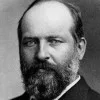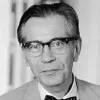It’s almost been worth this depression to find out how little our big men know.
Will Rogers (1879-1935) American humorist
Column (1930-01-11)
(Source)
Variant: "It's almost worth the Great Depression to learn how little our big men know.
Collected in Sanity Is Where You Find It, ch. 8 (1955) [ed. Donald Day].
Quotations about:
crisis
Note not all quotations have been tagged, so Search may find additional quotes on this topic.
This basic clash of ideas and wills is but one of the forces reshaping our globe — swept as it is by the tides of hope and fear, by crises in the headlines today that become mere footnotes tomorrow. Both the successes and the setbacks of the past year remain on our agenda of unfinished business. For every apparent blessing contains the seeds of danger — every area of trouble gives out a ray of hope — and the one unchangeable certainty is that nothing is certain or unchangeable.
And yet there are some men here in this Senate who either genuinely fail to see, or make a pretense of not seeing, the disasters by which we are menaced. Their mildness has fostered Catiline’s hopes, and their refusal to believe in his growing conspiracy has given it strength. Had I punished Catiline, their influence would cause many persons, some of them malignant but others merely ignorant, to say that I had acted with tyrannical brutality.
[Quamquam non nulli sunt in hoc ordine qui aut ea quae imminent non videant aut ea quae vident dissimulent; qui spem Catilinae mollibus sententiis aluerunt coniurationemque nascentem non credendo conroboraverunt; quorum auctoritate multi non solum improbi verum etiam imperiti, si in hunc animadvertissem, crudeliter et regie factum esse dicerent.]
Marcus Tullius Cicero (106-43 BC) Roman orator, statesman, philosopher
Orationes in Catilinam [Catilinarian Orations], No. 1, § 12, cl. 30 (1.12.30) (63-11-08 BC) [tr. Grant (1960)]
(Source)
Urging the Senate banish Catiline before he and his followers overthrow the Roman Republic.
(Source (Latin)). Alternate translations:Although there are some in this House, who either not see what is imminent, or dissemble what they see; who have cherish'd the hopes of Catiline with useless (?) Votes, and have confirmed the rising Conspiracy, by not believing it: whose Authority many, not onely out of malice, but of simplicity following, had I executed him, would have said, it had been a cruel and tyrannical Act
[tr. Wase (1671)]Yet even now, in this very assembly, there are senators, and those not a few, who do not see the impending danger; or, seeing it, think proper to disguise their sentiments. By specious moderation they have pampered the hopes of Catiline, and, affecting to think my fears no more than a false alarm; they favoured the conspiracy in its birth; By their example numbers have been influenced; the evil-minded raised a spirit of discontent, and the weak joined in the clamour, All of that description would be ready to pronounce the death of Catiline the act of a violent and arbitrary Consul.
[tr. Sydney (1795)]Though there are some men in this body who either do not see what threatens, or dissemble what they do see; who have fed the hope of Catiline by mild sentiments, and have strengthened the rising conspiracy by not believing it; influenced by whose authority many, and they not wicked, but only ignorant, if I punished him would say that I had acted cruelly and tyrannically.
[tr. Yonge (1856)]Although there are in this assembly some who either may not see those things which are impending, or who may conceal their knowledge of those things which they see; who have nourished the hope of Catiline by mild opinions, and who have strengthened the growing conspiracy by not believing it; following whose authority many, not only the wicked, but also the unskillful, if I should have inflicted punishment on him, would say that this had been done cruelly and tyrannically.
[tr. Mongan (1879)]Although there are some in this order (assembly), who either may see not those (things) which impend, or may dissemble those (things), which they see: who have nourished the hope of Catiline by soft (mild) opinions, and have strengthened the growing conspiracy by believing (it) not. The authority of whom many having followed, not only the dishonest, but also the unskillful, if I might have animadverted upon him (if I had punished him), would say (it) to have been done cruelly and royally (tyrannically).
[tr. Underwood (1885)]Although there are some in this order [body], who either may not see these (things) which impend, or may dissemble those (things) which they see: who have nourished the hope of Catiline by soft [mild] opinions, and have strengthened the growing conspiracy by not believing (it). The authority of whom many have followed, not only the dishonest, but also the inexperienced, if I had given attention to [punished] him they, would say )it) to have [had] been done cruelly and royally [tyrannically].
[tr. Dewey (1916)]And yet there are several men in this body, of the kind who either do not see what is threatening to them, or disguise what things they see, and these men nourish the hope of Catiline by tender notions and strengthen the young conspiracy by not believing; by whose authority many not only wicked (men), but also inexperienced (men), if I were to have (Catiline) punished , would say that it had been done cruelly and despotically.
[IB Notes]
In our time we have come to live with moments of great crisis. Our lives have been marked with debate about great issues; issues of war and peace, issues of prosperity and depression. But rarely in any time does an issue lay bare the secret heart of America itself. Rarely are we met with a challenge, not to our growth or abundance, our welfare or our security, but rather to the values and the purposes and the meaning of our beloved Nation.
The issue of equal rights for American Negroes is such an issue. And should we defeat every enemy, should we double our wealth and conquer the stars, and still be unequal to this issue, then we will have failed as a people and as a nation.Lyndon B. Johnson (1908-1973) American politician, educator, US President (1963-69)
Speech (1965-03-15), “The American Promise,” Joint Session of Congress [06:27]
(Source)
Why weren’t these problems obvious to the Maya kings, who could surely see their forests vanishing and their hills becoming eroded? Part of the reason was that the kings were able to insulate themselves from problems afflicting the rest of society. By extracting wealth from commoners, they could remain well fed while everyone else was slowly starving. What’s more, the kings were occupied with their own power struggles. They had to concentrate on fighting one another and keeping up their images through ostentatious displays of wealth. By insulating themselves in the short run from the problems of society, the elite merely bought themselves the privilege of being among the last to starve.
Jared Diamond (b. 1937) American geographer, historian, ornithologist, author
“The Ends of the World as We Know Them,” New York Times (1 Jan 2005)
(Source)
The Church of the Interdependency and other religions found their places of worship jammed, as the faithful, the newly faithful and the not-actually-at-all-faithful-but-this-is-some-weird-shit-and-I’m-hedging-my-bets came in and, depending on experience, prayed, meditated or wondered what it was exactly they were supposed to do now that they were there.
What are the choices that we must make if we are now to succeed, and not to fail? […] Two types of choices seem to me to have been crucial to tipping their outcomes towards success or failure: long-term planning, and willingness to reconsider core values. On reflection, we can also recognize the crucial role of these same two choices for the outcomes of our individual lives.
One of those choices has depended on the courage to practice long-term thinking, and to make bold, courageous, anticipatory decisions at a time when problems have become perceptible but before they have reached crisis proportions. […] The other crucial choice illuminated by the past involves the courage to make painful decisions about values. Which of the values that formerly served a society well can continue to be maintained under new changed circumstances? Which of these treasured values must instead be jettisoned and replaced with different approaches?
Jared Diamond (b. 1937) American geographer, historian, ornithologist, author
Collapse: How Societies Choose to Fail or Succeed, ch. 16 “The World as a Polder” (2005)
(Source)
I have ferreted out the alarm clock, plugged it in, and set it, musing on the word “alarm” and why the world must be wakened daily to cries of panic and danger.
The most intelligent of the Nazis, the legal theorist Carl Schmitt, explained in clear language the essence of fascist governance. The way to destroy all rules, he explained, was to focus on the idea of the exception. A Nazi leader outmaneuvers his opponents by manufacturing a general conviction that the present moment is exceptional, and then transforming that state of exception into a permanent emergency. Citizens then trade real freedom for fake safety.
Timothy Snyder (b. 1969) American historian, author
On Tyranny: Twenty Lessons from the Twentieth Century, ch. 17 (2017)
(Source)
Nobody but radicals have ever accomplished anything in a great crisis. Conservatives have their place in the piping times of peace; but in emergencies only rugged issue men amount to much.
James A. Garfield (1831-1881) US President (1881), lawyer, lay preacher, educator
Diary (1876)
(Source)
For a man of sensitivity and compassion to exercise great powers in a time of crisis is a grim and agonizing thing.
Richard Hofstadter (1916-1970) American historian and intellectual
The American Political Tradition: And the Men Who Made It, Part 5, ch. 7 (1958)
(Source)
Referring to Abraham Lincoln and the Civil War.
The salvation of America and of the human race depends on the next election, if we believe the newspapers. But so it was last year, and so it was the year before, and our fathers believed the same thing forty years ago.
She smoothed her hair back from her forehead and looked at herself in the mirror. She looked like she always looked. It was probably a truth about tragedy, she thought, while the tragedy is going on people look pretty much the way they looked when it wasn’t.
Life is not made up of dramatic incidents — even the life of a nation. It is made up of slowly evolving events and processes, which newspapers, by a score of different forms of emphasis, can reasonably attempt to explore from day to day. But television news jerks from incident to incident. For the real world of patient and familiar arrangements, it substitutes an unreal world of constant activity, and the effect is already apparent in the way which the world behaves. It is almost impossible, these days, to consider any problem or any event except as a crisis; and, by this very way of looking at it, it in fact becomes a crisis.
In times like the present, men should utter nothing for which they would not willingly be responsible through time and in eternity.
Abraham Lincoln (1809-1865) American lawyer, politician, US President (1861-65)
Message (1862-12-01) to Congress, Annual Message (State of the Union)
(Source)
“Life is like a sewer — what you get out of it depends on what you put into it.” It’s always seemed to me that this is precisely the sort of dynamic, positive thinking that we so desperately need today in these trying times of crisis and universal brouhaha.
The convictions that leaders have formed before reaching high office are the intellectual capital they will consume as long as they continue in office. There is little time for leaders to reflect. They are locked in an endless battle in which the urgent constantly gains on the important. The public life of every political figure is a continual struggle to rescue an element of choice from the pressure of circumstance.
The crisis in which [our country] is placed cannot but be unwelcome to those who love peace, yet spurn at a tame submission to wrong.
Thomas Jefferson (1743-1826) American political philosopher, polymath, statesman, US President (1801-09)
Letter (1808-02-29) to the New York Tammany Society
(Source)
Sent to Jacob Van Dervoort, and addressed to "the Society of Tammany or Columbian order No. 1 of the city of New York."
There is such a thing as internal collapse. Despairing certitude does not infiltrate a human being without displacing and disrupting certain profound elements that sometimes constitute the man himself. Grief, when it reaches this pitch, routs all strength of conscience. These are deadly crises. Few of us emerge from them true to ourselves and steadfast in our duty. When the limit of endurance is exceeded, the most unshakeable virtue is undermined.
[Il y a des effondrements intérieurs. La pénétration d’une certitude désespérante dans l’homme ne se fait point sans écarter et rompre de certains éléments profonds qui sont quelquefois l’homme lui-même. La douleur, quand elle arrive à ce degré, est un sauve-qui-peut de toutes les forces de la conscience. Ce sont là des crises fatales. Peu d’entre nous en sortent semblables à eux-mêmes et fermes dans le devoir. Quand la limite de la souffrance est débordée, la vertu la plus imperturbable se déconcerte.]
Victor Hugo (1802-1885) French writer
Les Misérables, Part 4 “Saint Denis,” Book 15 “The Rue de L’Homme Armé,” ch. 1 (4.15.1) (1862) [tr. Donougher (2013)]
(Source)
Valjean "internally collapsing" at the realization that Cosette plans to leave him for Marius, and deciding to track Marius down to confront or even kill him.
(Source (French)). Alternate translations:There are interior subsoilings. The penetration of a torturing certainty into man does not occur without breaking up and pulverising certain deep elements which are sometimes the man himself. Grief, when it reaches this stage, is a panic of all the forces of the soul. These are fatal crises. Few among us come through them without change, and firm in duty. When the limit of suffering is overpassed, the most imperturbable virtue is disconcerted.
[tr. Wilbour (1862)]There are such things as internal landslides; the penetration of a desperate certainty into a man is not effected without removing and breaking certain profound elements which are at times the man himself. Grief, when it attains that pitch, is a frantic flight of all the forces of the conscience, and such crises are fatal Few among us emerge from them equal to ourselves and firm in our duty, for when the limit of suffering is exceeded the most imperturbable virtue is disconcerted.
[tr. Wraxall (1862)]There is such a thing as the sudden giving way of the inward subsoil. A despairing certainty does not make its way into a man without thrusting aside and breaking certain profound elements which, in some cases, are the very man himself. Grief, when it attains this shape, is a headlong flight of all the forces of the conscience. These are fatal crises. Few among us emerge from them still like ourselves and firm in duty. When the limit of endurance is overstepped, the most imperturbable virtue is disconcerted.
[tr. Hapgood (1887)]There is such a thing as spiritual collapse. The thrust of a desperate certainty into a man cannot occur without the disruption of certain profound elements which are sometimes the man himself. Anguish, when it has reached this stage, becomes a panic-flight of all the powers of conscience. There are mortal crises from which few of us emerge in our right mind, with our sense of duty still intact. When the limit of suffering is overpassed the most impregnable virtue is plunged in disarray.
[tr. Denny (1976)]There are interior collapses. The penetration of a torturing certainty within man does not occur without breaking up and pulverizing certain deep elements that are sometimes the man himself. Grief, when it reaches this level, is a panic of all the forces of consciousness. These are fatal crises. Few among us come through them unchanged and firm in duty. When the limit of suffering is topped, the most imperturbable virtue is disconcerted.
[tr. Wilbour/Fahnestock/MacAfee (1987)]
We learn geology the morning after the earthquake.
Ralph Waldo Emerson (1803-1882) American essayist, lecturer, poet
Essay (1860), “Considerations by the Way,” The Conduct of Life, ch. 7
(Source)
Based on a course of lectures by that name first delivered in Pittsburg, 1851-03.
Whatever barriers we put up are gone. Even if it’s just momentary. We are judging people by not the color of their skin, but the content of their character. You know, all this talk about “These guys are criminal masterminds. They’ve gotten together and their extraordinary guile and their wit and their skill …” It’s, it’s — it’s a lie. Any fool can blow something up. Any fool can destroy. But to see these guys, these firefighters and these policemen and people from all over the country, literally with buckets, rebuilding … that’s extraordinary. And that’s why we have already won … they can’t … it’s light. It’s democracy. They can’t shut that down.
Jon Stewart (b. 1962) American satirist, comedian, and television host. [b. Jonathan Stuart Leibowitz]
The Daily Show (2001-09-20)
(Source)
Monologue on "September 11, 2001."
The reason I don’t worry about society is, nineteen people knocked down two buildings and killed thousands. Hundreds of people ran into those buildings to save them. I’ll take those odds every fucking day.
I can imagine no greater disservice to the country than to establish a system of censorship that would deny to the people of a free republic like our own their indisputable right to criticize their own public officials. While exercising the great powers of the office I hold, I would regret in a crisis like the one through which we are now passing to lose the benefit of patriotic and intelligent criticism.
Every crisis has both its dangers and its opportunities. Each can spell either salvation or doom.
Martin Luther King, Jr. (1929-1968) American clergyman, civil rights leader, social activist, preacher
Stride Toward Freedom, ch. 11 “Where Do We Go from Here?” (1958)
(Source)
“I wish it need not have happened in my time,” said Frodo.
“So do I,” said Gandalf, “and so do all who live to see such times. But that is not for them to decide. All we have to decide is what to do with the time that is given us.”J.R.R. Tolkien (1892-1973) English writer, fabulist, philologist, academic [John Ronald Reuel Tolkien]
The Lord of the Rings, Vol. 1: The Fellowship of the Ring, Book 1, ch. 2 “The Shadow of the Past” (1954)
(Source)



























